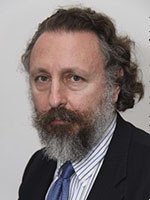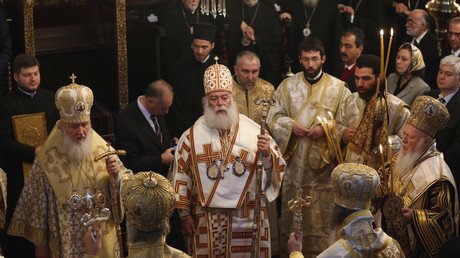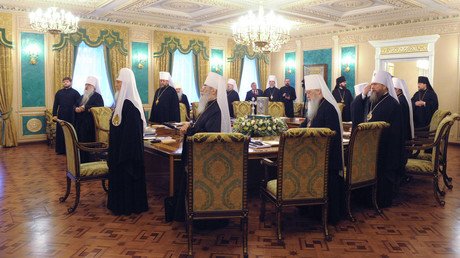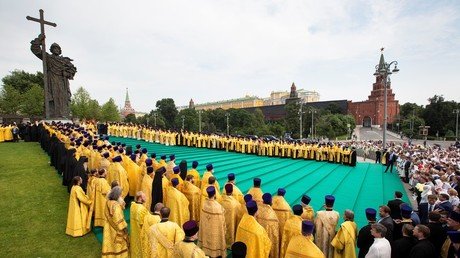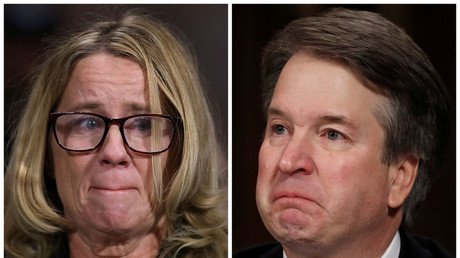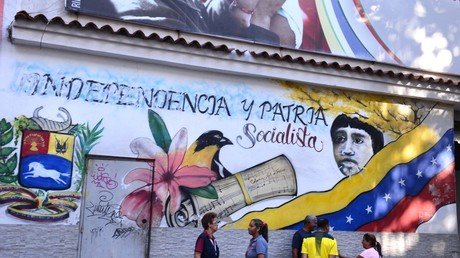Faith, power, money: Conflicting agendas in Ukraine Church politics
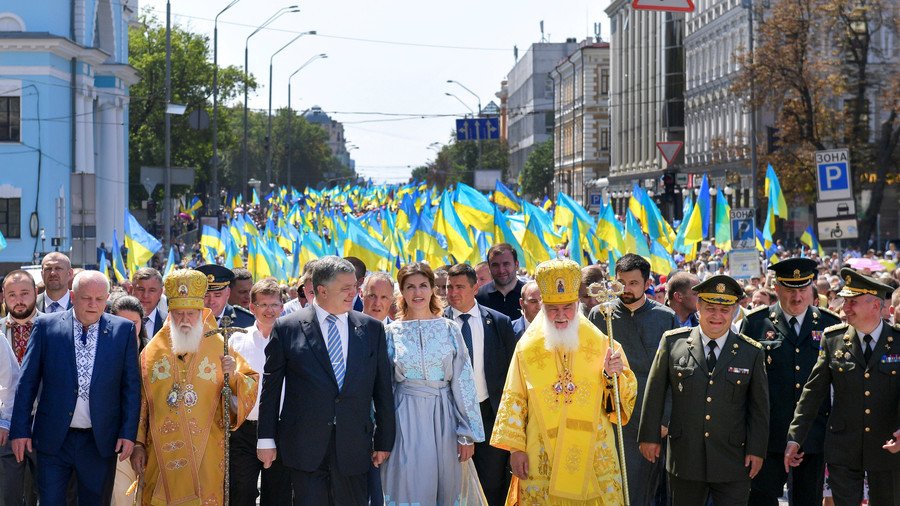
One of the most contentious and significant controversies in the world today is also one of the least-well understood.
In part, this is because it involves matters of faith and church governance, the importance of which many people, especially some of a secular mind who scorn mere “religion,” tend to underestimate.
That is a mistake, certainly with respect to the storm that seems on the verge of plunging Ukraine into a new cycle of violence. That may happen if, as seems quite possible, Ecumenical Patriarch Bartholomew of Constantinople recognizes an “autocephalous” (completely self-ruling) Orthodox Church in Ukraine over the objections of the Russian Orthodox Church, of which the Ukrainian Church is an integral part.
This question is often misreported in the Western media as Constantinople’s response to a request from the Ukrainian Orthodox Church for autocephaly. This is inaccurate. The only Ukrainian Orthodox body recognized as canonical by the rest of the Orthodox Christian world – even including Constantinople at this point – is the autonomous part of the Russian Orthodox Church under the authority of Metropolitan Onufry of Kiev, which is not asking for autocephaly.
So who is making such a request? People who have no authority to do so. This means first of all Ukrainian politicians, starting with President Petro Poroshenko (whose own Orthodox affiliation is subject to question), who evidently calculates that midwifing an independent Ukrainian national church completely divorced from Russia will enhance his re-election prospects next year. Not to be outdone, his rival, Yulia Tymoshenko also is in favor. These proponents of autocephaly are explicit that their goals are political. “Shortly, we will have an independent Ukrainian church as part of an independent Ukraine. This will create a spiritual independence from Russia,” Poroshenko told the Washington Post.
Also asking for autocephaly is so-called “Patriarch Filaret” Denysenko and his supposed Ukrainian Orthodox Church of the “Kiev Patriarchate,” which is recognized as canonical by exactly nobody. Denysenko, who was excommunicated by the Russian Orthodox Church in 1997, hopes that will change soon. Patriarch Bartholomew has dispatched to Ukraine two envoys (“exarchs”), one each from the US and Canada, to meet with Denysenko, possibly even to consecrate his “bishops” to give them supposedly valid status.
Unfortunately, there is also involvement from another direction by people whose agenda is entirely political. Western governments see a geopolitical opportunity in exacerbating an ecclesiastical crisis in Ukraine and pitting Constantinople against Moscow. Doing so, they believe, will undermine Russia’s geopolitical “soft power” through the Orthodox Church and further alienate Russians and Ukrainians from one another.
As explained by Valeria Z. Nollan, professor emerita of Russian Studies at Rhodes College, “The real goal of the quest for autocephaly of the Ukrainian Orthodox Church is a de facto coup: a political coup already took place in 2014, poisoning the relations between western Ukraine and Russia, and thus another type of coup – a religious one – similarly seeks to undermine the canonical relationship between the Ukrainian Orthodox Church and Moscow. ”
The Western proponents are as crassly honest about the political aspects as the Ukrainian politicians. The German ambassador in Kiev, not known to have any particular theological acuity, opined in July, that autocephaly would strengthen Ukrainian statehood. The hyper-establishment Atlantic Council, which hosted Denysenko on a recent visit to Washington, notes: “With the Russian Orthodox Church as the last source of Putin’s soft power now gone, Ukraine’s movement out of Russia’s orbit is irreversible.”
Likewise the US State Department, after a short period of appropriately declaring that “any decision on autocephaly is an internal church matter,” last week reversed its position and issued a formal statement: “The United States respects the ability of Ukraine’s Orthodox religious leaders and followers to pursue autocephaly according to their beliefs. We respect the Ecumenical Patriarch as a voice of religious tolerance and interfaith dialogue.”
While avoiding a direct call for autocephaly, the statement gives the unmistakable impression of such endorsement, which is exactly how it was reported in the media, for example, “US backs Ukrainian Church bid for autocephaly.” The State Department’s praise for the Ecumenical Patriarchate reinforces that clearly intended impression.
There may be more to the State Department’s position than meets the eye, however. According to an unconfirmed report originating with the members of the Russian Orthodox Church Outside of Russia (an autonomous New York-based jurisdiction of the Moscow Patriarchate), in July of this year State Department officials (possibly including Secretary of State Mike Pompeo personally) warned the Greek Orthodox archdiocese (also based in New York but part of the Ecumenical Patriarchate) that the US government is aware of the theft of a large amount of money, about $10 million, from the budget for the construction of the Orthodox Church of St. Nicholas in New York (This is explained further below).
The warning also reportedly noted that federal prosecutors have documentary evidence confirming the withdrawal of these funds abroad on the orders of Ecumenical Patriarch Bartholomew. It was suggested that Secretary Pompeo would “close his eyes” to this theft in exchange for movement by the Patriarchate of Constantinople in favor of Ukrainian autocephaly, which helped set Patriarch Bartholomew on his current course.
Again, it must be emphasized that this report is unconfirmed, though one doesn’t see mainstream American media falling over themselves trying to track down the facts. The official statement of the Greek archdiocese does not report a personal one-on-one meeting between Pompeo and Archbishop Demetrios, but the message could have been communicated between subordinate personnel on both sides.
What lends the report an air of believability, however, is the depth of the scandal to which it refers. As few outside the Orthodox Christian community may recall, only one place of worship of any faith was destroyed on September 11, 2001, and only one building not part of the World Trade Center complex was completely destroyed in the attack. That was St. Nicholas Greek Orthodox Church, a small urban parish church established at the end of World War I and dedicated to St. Nicholas the Wonderworker, who is very popular with Greeks as the patron of sailors. The humble little church reportedly housed icons and relics donated to the parish by Russia’s last Tsar, Nicholas II, none of which were recovered.
In the aftermath of the 9/11 attack, and following a lengthy legal battle with the Port Authority, which opposed rebuilding the church, in 2011 the archdiocese launched an extensive campaign to raise funds for a brilliant innovative design by the renowned Spanish architect Santiago Calatrava based on traditional Byzantine forms. Wealthy donors and those of modest means alike enthusiastically contributed to the effort. A major role was played by the archdiocesan women’s organization, the Ladies Philoptochos, who undertook it as a “sacred mission”: “Together let us rebuild Saint Nicholas for all future generations, and for the many millions of people who will visit every year the new World Trade Center, the National September 11 Memorial Museum and our National Shrine, the only house of worship at Ground Zero.” By the end of 2017, almost $37 million had been raised and construction on this unique Orthodox Christian presence was proceeding apace.
Then – poof! – in December 2017 suddenly all construction was halted for lack of funds. Resumption would require on-hand an estimated $2 million. Despite the archdiocese calling in an audit by a major accounting firm, there’s been no clear answer to what happened to the money. Both the US Attorney and New York state authorities are investigating. There have been calls for Archbishop Demetrios’s resignation.
This is where we get back to Ukraine. If the State Department wanted to find the right button to push to spur Ecumenical Patriarch Bartholomew to move on the question of autocephaly, the Greek archdiocese in the US is it. Let’s keep in mind that in his home country, Turkey, Patriarch Bartholomew has virtually no local flock – only a few hundred mostly elderly Greeks left huddled in Istanbul’s Fener district. Whatever funds the Patriarchate derives from other sources (the Greek government, the Vatican, the World Council of Churches), the financial lifeline is Greeks (including this writer) in what is still quaintly called the “Diaspora” in places like America, Australia, and New Zealand. And of these, the biggest cash cow is the Greek-Americans.
That’s why, when Patriarch Bartholomew issued a call in 2016 for what was billed as an Orthodox “Eighth Ecumenical Council” (the first one since the year 787!), the funds largely came from America, to the tune of up to $8 million according to this writer’s sources. Intended by some as a modernizing Orthodox “Vatican II,” the event was doomed to failure by a boycott organized by Moscow over what the latter saw as Patriarch Bartholomew’s adopting papal or even imperial prerogatives – now sadly coming to bear in Ukraine. It’s an open question how much the Ecumenical Patriarchate’s shaking down the Greeks in the US to pay for extravagant boondoggles like the 2016 “Council” contributed to the financial mess at the New York archdiocese, which in turn may have opened them up to pressure from the State Department to get moving on Ukraine.
Finally, while the Ukraine controversy does largely involve politicians’ agendas and a struggle for supremacy between Constantinople and Moscow, it is not entirely devoid of moral and spiritual significance. It should be noted that among the most ardent nominally Orthodox advocates of Ukrainian autocephaly are groups of American academics like the purveyors of moral and sexual LGBT and “genderqueer” ideology “Orthodoxy in Dialogue” and the hardly less revolutionary “Orthodox Christian Studies Center” at New York’s Fordham University.
Orthodoxy in Dialogue recently issued a call – accompanied by a pairing of an Orthodox cross with LGBT rainbow symbolism – to bishops in all US Orthodox jurisdictions to curtail their anti-abortion witness and adopt the immoral sexual agendas that have wrought havoc in the Western confessions, a call that should receive a sharp condemnation from the hierarchs.
No one – and certainly not this writer – should accuse Patriarch Bartholomew, most Ukrainian politicians, or even the fake patriarch Denysenko of sympathizing with such anti-Orthodox values. But the converse is not true. These advocates know they cannot advance their goals if the conciliar and traditional structure of Orthodoxy remains intact. Thus they welcome efforts by Constantinople to centralize power while throwing the Church into discord, especially the Russian Church, which is vilified in some Western circles precisely because it is a global beacon of traditional Christian moral witness.
This aspect points to another reason for Western governments to support Ukrainian autocephaly as a spiritual offensive against Russia and Orthodoxy. The post-Maidan leadership harp on the “European choice” the people of Ukraine supposedly made in 2014, but they soft-pedal the accompanying moral baggage the West demands, symbolized by “gay” marches organized over Christian objections in Orthodox cities like Athens, Belgrade, Bucharest, Kiev, Odessa, Podgorica, Sofia, and Tbilisi. Even under the Trump administration, the US is in lockstep with our European Union friends in pressuring countries liberated from communism to adopt such “European values.”
Ukrainians especially need to ask themselves why Western governments are so happy to cheer on developments that could plunge the Orthodox Church into worldwide schism, and Ukraine into another round of fratricidal violence. The unedifying behind-the-scenes machinations, many details of which remain under wraps, should give them further pause.
Think your friends would be interested? Share this story!
The statements, views and opinions expressed in this column are solely those of the author and do not necessarily represent those of RT.
